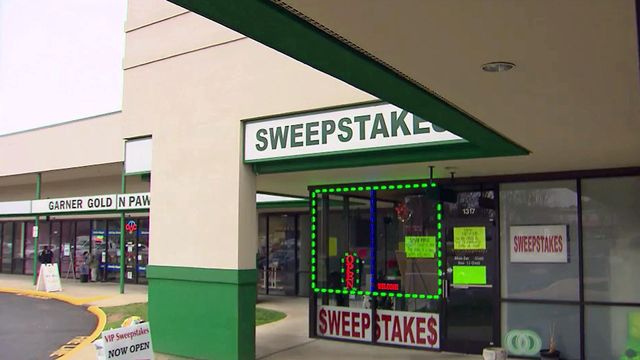Sweepstakes investigation shines light into campaign finance
A State Board of Elections investigation found no North Carolina candidate acted improperly in taking money from sweepstakes operators three years ago. But the board's report revealed details of how money and lobbying intersect in Tar Heel campaigns.
Posted — UpdatedWhile members of the board were clearly frustrated by what they saw as money from businesses or illegal enterprises being funneled into North Carolina campaigns, they endorsed a report finding that the players involved did not violate state campaign finance law.
"It seems to me that we have covered all the issues and found no reasonable cause to refer this anywhere else," said board Chairman Josh Howard. "While we all may have some pause about the source of funds and campaign finance policy, there's not a violation of the law as it reads today."
At the time, video sweepstakes companies were pushing hard to legalize their operations in North Carolina and other states. Sweepstakes operators argue their machines merely use entertaining displays to reveal whether someone has won a pre-determined prize in a drawing. But law enforcement authorities and courts have said they are akin to video gambling machines outlawed in North Carolina a decade ago.
It is still possible to find sweepstakes rooms in many places throughout the state despite the games occupying a legal gray area and numerous legislative efforts to outlaw them.
Questions raised
Among the industry leaders at that time was Chase E. Burns and his company IIT. Burns alone made $274,500 in donations to North Carolina candidates, Democrats and Republicans, making him by far one of the biggest donors to political campaigns and causes during the 2011-12 cycle. McCrory received $70,000 in contributions from Burns and others.
An April 2013 complaint from Democracy North Carolina, a good-government watchdog, asked the State Board of Elections to look at numerous irregularities connected to campaign donations from Burns and other sweepstakes operators. Along with reporting from the Associated Press, the Democracy NC complaint raised questions about whether corporate money was used to make contributions to candidates, which is forbidden under state campaign finance law, and whether lobbyists illegally gathered checks from a number of donors and presented them to politicians such as McCrory at one time, a practice known as bundling.
Around the same time Democracy NC was making its complaint, Florida authorities arrested a number of players in the sweepstakes industry, including Burns. Burns eventually pleaded guilty to two counts of assisting in the operation of an illegal lottery in Florida and settled an Oklahoma charge by forfeiting $3.5 million.
While investigators identified a few potentially minor violations by one lobbyist, the board's report exonerates McCrory and other political figures, much to the displeasure of Democrats who had hoped the scandal would be a drag on McCrory's 2016 re-election chances.
"Gov. McCrory handpicked the board he wanted investigating his corporate sweepstakes contributions," Democratic Party spokesman Ford Porter said in a statement. "Today, those appointees brazenly let him keep the money and sought to end the story."
It's worth pointing out that McCrory appointed two Democratic members suggested by their party. Also relevant is that Democrats like Dalton and Senate Minority Leader Dan Blue benefited from sweepstakes donations as well as top Republicans.
The five-member State Board of Elections is made up of three Republicans, including Howard, as well as two Democrats. Joshua Malcolm, a Democratic member, said that board members may have an issue with where campaign donations came from, but they are constrained by how the law is written.
"Someone who is making money through illegal means can take than money and contribute it for campaign, political purposes, and if they're contributing it as an individual, it's not a violation of the law," Malcolm said.
Campaign cash flows
While the board didn't find any wrongdoing, the report did provide details on how campaign cash flowed in the 2012 campaign.
Elections Director Kim Strach, who participated in the investigation, detailed how money came from Burns and other sweepstakes operators to Chris Clifton of Grace, Tisdale, and Clifton, a law firm that did work defending the industry against legal challenges. Clifton would then turn campaign checks over to Moore & Van Allen, a law firm the sweepstakes industry had hired to advise on political contributions and lobbying.
At the time those donations were flowing through Moore & Van Allen, McCrory worked there as a senior director for strategic initiatives.
Other parts of the written report detailed how executives from other sweepstakes companies met with McCrory and others.
For example, on Feb. 23, 2012, Harrison Kaplan of McGuire Woods Consulting arranged a meeting between McCrory and Gardner Payne, a former McGuire Woods lobbyist who worked for VS2, a software provider for the sweepstakes gaming industry. VS2 was a client of McGuire Woods, according to the report.
"The purpose of the meeting was to discuss the economic impact of the sweepstakes industry on the state of North Carolina. Mr. Payne expressed that the sweepstakes industry was legal and proposed that it should be regulated and taxed by the state," the report says.
Along with VS2, McCrory met with other McGuire Woods clients – officials representing charter schools, insurance agents and the hospice industry.
Both McGuire Woods and sweepstakes operators associated with VS2 were donors to McCrory.
"They were trying to get this industry legalized in North Carolina," said Bob Hall, director of Democracy NC, referring to the sweepstakes industry donors.
In that, the sweepstakes business was like any other industry that has given millions of dollars to North Carolina candidates.
"We got a glimpse of the pay-to-play system in North Carolina," Hall said, adding that the board's report raises more questions than the board has been able to answer. He called for other law enforcement agencies to look into the donations.
Related Topics
• Credits
Copyright 2024 by Capitol Broadcasting Company. All rights reserved. This material may not be published, broadcast, rewritten or redistributed.





